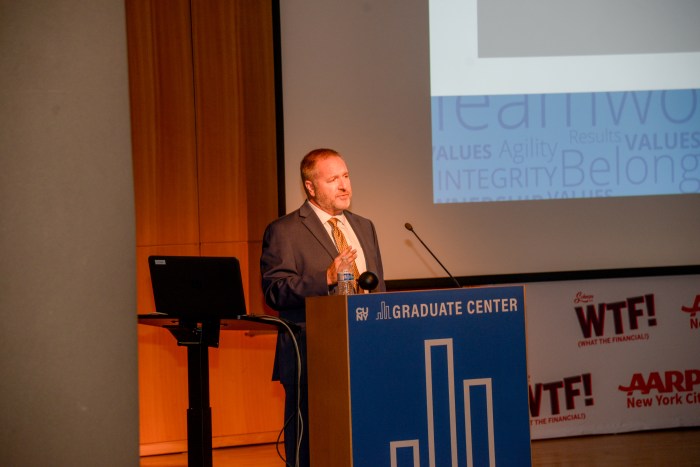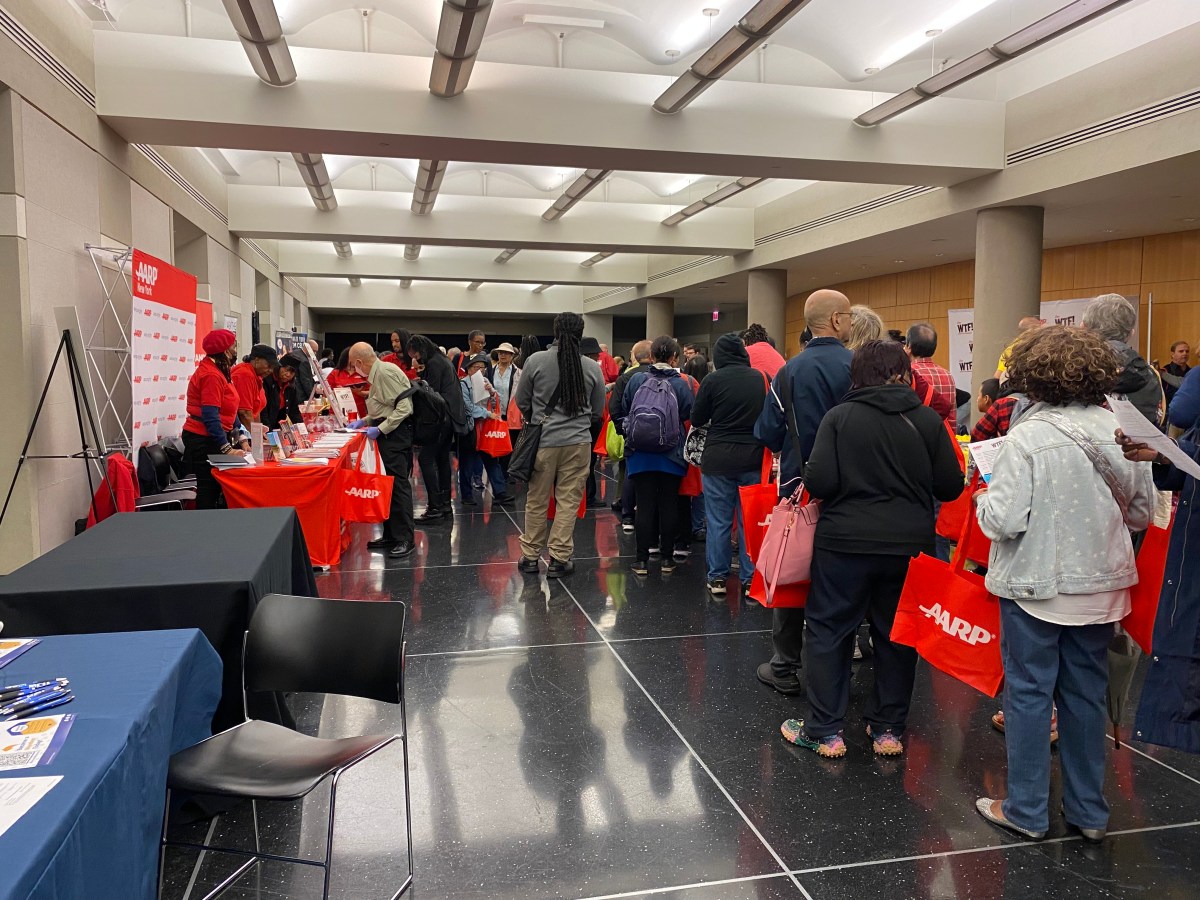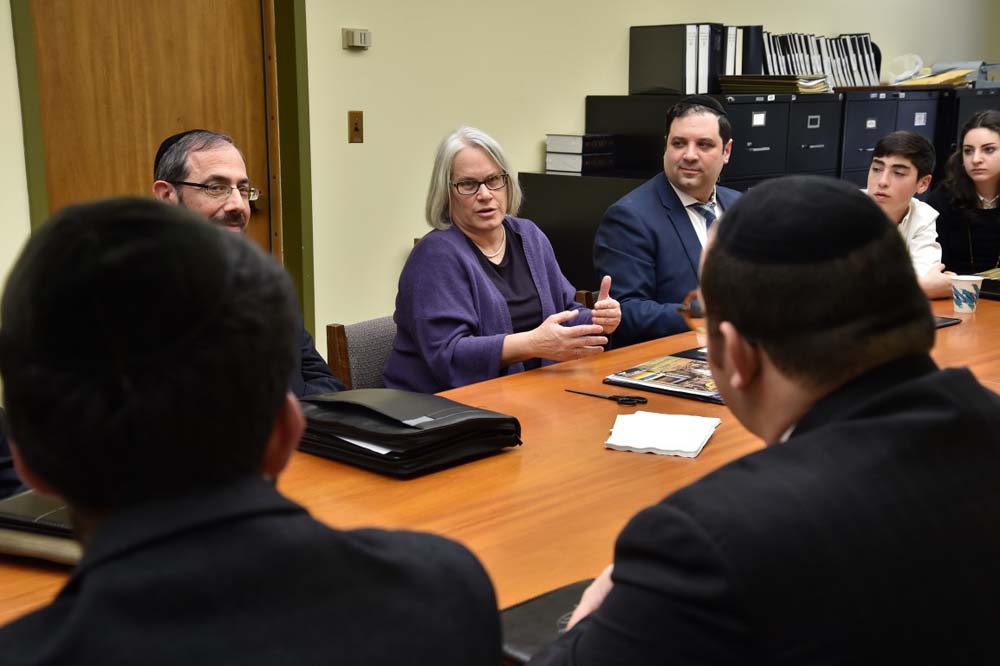It is never too late to plan for a comfortable future, even if you’re already retired in a time of inflation and an ever-increasing cost of living in NYC.
This was the message at “WTF! (What the Financial!) A Financial Empowerment Roadmap,” a free community event hosted by Schneps Media and AARP New York on Saturday to help New Yorkers prepare for their financial future.
More than 750 money-minded people attended the event, which was held at the City University of New York’s Graduate Center in Midtown. Experts from banking, investing and related fields discussed financial planning, Medicare options, money-saving tips and other topics found on the path to financial security.

Making your money last a lifetime
Sometimes, the most obvious wisdom in life is overlooked. While fancy investments are undoubtedly important for retirement, so is simply saving money–financial advice that rings true at any age, the financial experts stressed.
This is especially true at a time when many — more than 50% — of people in the United States do not feel that they are prepared for retirement, according to Beth Finkel, state director for AARP New York.
“What’s even worse is that a quarter of people think that they can never retire, that they always have to keep working,” she said.
Finkel said preparing for retirement can be overwhelming, but there are many resources available to help ease the process.
“There are so many ways to make it better, including checking in with Social Security. AARP has so much great information at aarp.org,” she said.
5 strategies for ensuring you do not run out of money
There is another bright spot. Diane Harris, a financial journalist and former editor-in-chief of Money magazine, gave the keynote speech at WTF! Whether a person has been steadily saving money for years, is late to the retirement party or has been out of the workforce for a significant period of time, she noted there are many strategies for achieving long-term financial wellness.
“Wherever you are at now, you can come up with a simple, practical plan to ensure your money will last a lifetime,” she said.
Harris shared five strategies New Yorkers can implement right now to have enough money for the rest of their lives.
Pump up your savings as much as you can for as long as you can.
“By far, when older Americans are asked today their top financial regret, the answer inevitably is, ‘I wish I had saved more,’“ Harris said.
Keep your hand in the workforce…but maybe not your whole body
Americans can start Social Security at age 62. Holding off until later in life can increase a person’s monthly benefits, but it also means staying in the workforce.
“Maybe you just don’t want to work full-time until you’re 70,” Harris said. “You’ve been working really hard, maybe you want to stop and smell the roses. You want to make sure that you can retire while you still feel well enough to do all the wonderful things that you planned for your retirement.“
Instead of quitting or retiring all at once, Harris suggested switching to part-time work, consulting, freelancing or even a side business.
Protect yourself from losses in the early years of your retirement.
Poor returns on investments during the first five years of retirement are worse than poor returns after five years.
Be nimble and flexible when it comes to tapping your savings
Once you retire, consider following the “4% rule” to live comfortably in your golden years.
“If you withdraw 4% of your savings in your first year of retirement and then you adjust the amount that you take out every year for inflation, your money should last at least 30 years, according to historical data,” Harris said.
However, the financial pro stressed that this rule should be used as a starting point. Retirees should be flexible about how much they withdraw from their retirement accounts, depending on the stock market’s performance.
Choose an investment mix that will help you stay ahead of inflation.
Inflation has hit Americans hard across the country, including those who live on a fixed income. Retirees should invest their savings in a way that will keep their money growing, Harris said.
“The best way to do that — in fact the only way to do that — is to always have a healthy portion of the money you’ve invested in your retirement in stocks,” she said. “Stocks are the only investments that have been able to beat inflation consistently over time,” Harris said.

More financial wisdom
Trusting your funds with a “fiduciary”
A key point that the experts at WTF! agreed on is that it is never too late to start saving your money—even if your retirement assets are already set. And one of the most efficient ways to do that is by working with a financial planner, sai dJames Lee, 2024 past president of the board of directors of the Financial Planners Association.
“Financial planning is critically important for everyone so that they can plan for their future wealth,” he said.
Lee discussed the qualifications and ethical standards people should look for when they hire a financial planner. One of the most important qualifications too look for in a professional financial planner is trustworthiness. Find a financial planner who is a fiduciary — a planner who, by law, must manage a client’s money for their benefit, not personal gain.
“Being able to engage with a competent, ethical financial planner is so important,” he said. “Engaging with someone who is legally obligated to act in your best interest over their own is very important. That’s called a fiduciary standard. That is a legal obligation that requires financial planners or anyone you engage with to act in your best interest.”
A word about Medicare
Frank Winter, an outreach specialist at the U.S. Centers for Medicare and Medicaid Services, discussed new updates in Medicare, including improvements to the program made under the Inflation Reduction Act, signed into law in 2022.
A major improvement is a yearly cap ($2,000 in 2025) on out-of-pocket prescription drug costs in Medicare Part D. (Medicare is divided into several parts based on enrollee’s needs.)
Another update in Medicare is a new prescription payment plan.
“There is also a new prescription payment plan where it might be advantageous for some folks to be able to spread their costs out throughout the year instead of having them bunched up with copays at the beginning of the year,” Winter said.
Winter also explained the Medicare program to attendees by discussing the kinds of choices they have to make when enrolling, important deadlines to know, and when open enrollment starts, which is Oct. 15 to Dec. 7.
More information about Medicare is available at medicare.gov.

Watching out for identity theft
Another important topic that was discussed at WTF! was what to do if or when you are the victim of identity theft.
Michael Gerty, business development officer at Municipal Credit Union, stressed the importance of reporting an identity theft case immediately. Initial steps for victims of identity theft include knowing their credit report, closing any fraudulent accounts, reporting the case to the Federal Trade Commission (FTC), and filing a police report.
Gerty underscored the importance of having documentation from the FTC.
“You have to call the FTC. Or go on their website,” he said. “They are a government agency. They give you an affidavit that says ‘I had identity theft committed against me.”
This document is important, Gerty said, because it will make the reporting process easier.
“This is going to be given back to the credit bureaus. This is going to be used at the police station when you go to there,” he said, adding that law enforcement will need the affidavit to conduct the investigation.




































